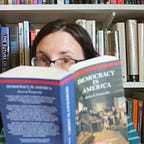Attention, Bay Staters! Here’s Why We (and by extension, everyone in the country) Need to Support H3610 RIGHT NOW.
As a Massachusetts native, I’ve had the good fortune to live in the safest state in the country when it comes to gun violence. This is probably not a coincidence: the Bay State enforces some of the nation’s strongest gun-safety laws, including licensing requirements, gun-purchase records, and an assault-weapon ban.
My best friend’s brother wasn’t so lucky. A week before my friend and I were to head off on a celebratory post-college trip, she called me. I could barely understand her through the tears, but I finally got the message: her older brother, in a fit of alcoholic depression, had shot himself to death.
This was in New Mexico, a state ranked by Giffords as having the seventh-highest gun death rate in the nation. This is probably not a coincidence: New Mexico has weak gun-safety laws and is a “shall-issue” state, meaning officials must issue gun permits to anyone meeting minimal statutory requirements. Brandon was a US citizen, he was not a convicted felon, and he was older than nineteen. Ergo, he got a gun.
He’s been on my mind lately not only because of national events, but for a reason closer to home: H3610, the “Extreme Risk Protection Order” (ERPO) bill currently in committee by Massachusetts lawmakers. Modeled on existing domestic-violence restraining-order laws, ERPOs allow family or law enforcement to petition courts for temporary removal of guns if a person is in crisis and potentially dangerous to self or others. ERPOs are already legal in California, Oregon, and Washington (Connecticut and Indiana allow petitions only by law enforcement).
Had ERPOs been legal in New Mexico, Brandon’s girlfriend, alarmed by his depression and drinking, could have petitioned the court for a temporary, emergency removal of his gun. The Parkland shooter’s mother, for example, called police numerous times about her troubled and violent son, who legally owned guns, but without ERPO legislation, neither she nor police were “allowed” to remove his weapons. As it is, 85 percent of gun suicide attempts are fatal. It was all too easy for Brandon to join this terrible majority.
Could an ERPO have saved his life? According to data (I’m still allowed to say that, right?), quite possibly.
You won’t find statistics at the CDC, which was banned in 1996, essentially by the NRA, from funding gun-control research. But smaller groups are stepping up, and the numbers are promising. Giffords calculates that for every 10–20 ERPOs issued, a life is saved. According to the Brady Center, 44 percent of issued ERPOs led to respondents receiving psychiatric treatment. An ERPO might have saved Brandon’s life… and helped him create a better one.
So what’s the problem?
At a recent lobbying day, I spoke with several Massachusetts legislators about H3610. One told me that when it comes to any proposed gun legislation, he gets “many more calls” from opponents. Indeed, the NRA’s Massachusetts affiliate has mobilized its members to call legislators and press them to vote against H3610, which the group characterizes as “cruel to the individual and his/her civil rights and extremely dangerous to the general public.”
Putting aside the preposterous notion that a restraining order would endanger public safety more than a person in crisis with a gun, a word about civil rights. Justice Kennedy notwithstanding, most people worried about gun violence don’t want to Take Away All The Guns. With more than 300 million flooding the country, how could we, anyway? ERPOs are intended not to punish gun-owners generally, but to prevent tragedies individually — and to do so in a way that protects due process, by mandating fair and timely hearings for respondents, typically within 21 days, and by allowing respondents to petition for termination of the order at any time.
ERPO legislation is currently under review by the state’s Joint Committee on Public Safety and Homeland Security. The Committee is scheduled to issue their report on April 15, but bills are notorious for dying “in committee.” Call the JCPSHS Senate office (617–722–1485) and House office (617–722–2230), and urge legislators to SUPPORT H3610.
When it comes to gun deaths, Massachusetts is the safest state in the nation. Let’s keep it that way.
Juliet Eastland is a writer with strong feelings about many issues.
